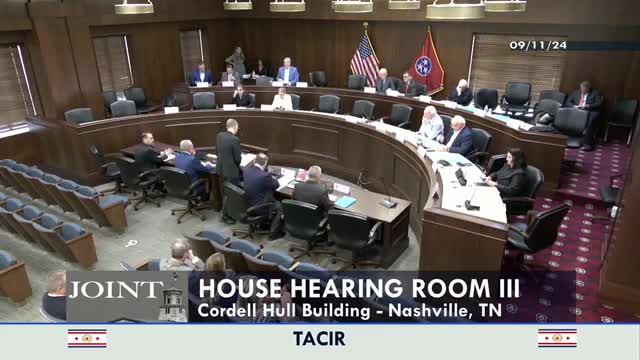Tennessee Courts Face Staffing Crisis Amid Legislative Debate
September 11, 2024 | TACIR, Deparments in Office of the Governor, Organizations, Executive, Tennessee
This article was created by AI summarizing key points discussed. AI makes mistakes, so for full details and context, please refer to the video of the full meeting. Please report any errors so we can fix them. Report an error »

In a recent government meeting, stakeholders discussed the implications of Senate Bill 2054, which addresses the staffing requirements for municipal courts with concurrent jurisdiction in Tennessee. The bill, which has already passed in the House, is currently under further study in the Senate, with a draft report expected in January 2024.
The core of the discussion centered around the interpretation of \"sufficient personnel\" as mandated by Tennessee law. Currently, 21 cities operate municipal courts with concurrent jurisdiction, allowing them to hear certain state law cases. However, the funding and staffing for these courts have raised concerns, particularly regarding the responsibilities of municipalities to provide adequate resources for district attorneys (DAs) and assistant DAs.
Mike Donovan, deputy director of the Tennessee District Attorney General Conference, emphasized the heavy caseloads faced by assistant DAs, averaging 1,700 cases per year, which is significantly higher than in many other states. He argued that without proper funding from municipalities, DAs struggle to adequately staff these courts, which are essential for prosecuting state law violations.
Judge Dean Dedmon, a municipal court judge, highlighted the importance of these courts in preventing the need for additional general sessions courts, which would further strain resources. He noted that cities like Dyersburg and Newbern have developed funding agreements to share the costs of assistant DAs, demonstrating a collaborative approach to managing these responsibilities.
Patrick Frogg, executive director of the Tennessee District Public Defender's Conference, echoed concerns about the overwhelming caseloads faced by public defenders, stating that adding municipal courts without adequate staffing only exacerbates the issue. He called for a more comprehensive understanding of the resource needs across the board.
City Manager Martin Granham from Red Bank shared insights into the operational challenges faced by municipalities, noting that while concurrent jurisdiction provides benefits, it also leads to financial shortfalls. He expressed concerns that the proposed legislation could increase costs for cities already struggling to balance their budgets.
The meeting concluded with discussions on the potential need for legislative adjustments to clarify the funding responsibilities of municipalities and the implications of ongoing litigation regarding the interpretation of \"sufficient personnel.\" Stakeholders emphasized the importance of collaboration between city officials and district attorneys to ensure that the legal system operates effectively while addressing the financial realities faced by local governments.
The core of the discussion centered around the interpretation of \"sufficient personnel\" as mandated by Tennessee law. Currently, 21 cities operate municipal courts with concurrent jurisdiction, allowing them to hear certain state law cases. However, the funding and staffing for these courts have raised concerns, particularly regarding the responsibilities of municipalities to provide adequate resources for district attorneys (DAs) and assistant DAs.
Mike Donovan, deputy director of the Tennessee District Attorney General Conference, emphasized the heavy caseloads faced by assistant DAs, averaging 1,700 cases per year, which is significantly higher than in many other states. He argued that without proper funding from municipalities, DAs struggle to adequately staff these courts, which are essential for prosecuting state law violations.
Judge Dean Dedmon, a municipal court judge, highlighted the importance of these courts in preventing the need for additional general sessions courts, which would further strain resources. He noted that cities like Dyersburg and Newbern have developed funding agreements to share the costs of assistant DAs, demonstrating a collaborative approach to managing these responsibilities.
Patrick Frogg, executive director of the Tennessee District Public Defender's Conference, echoed concerns about the overwhelming caseloads faced by public defenders, stating that adding municipal courts without adequate staffing only exacerbates the issue. He called for a more comprehensive understanding of the resource needs across the board.
City Manager Martin Granham from Red Bank shared insights into the operational challenges faced by municipalities, noting that while concurrent jurisdiction provides benefits, it also leads to financial shortfalls. He expressed concerns that the proposed legislation could increase costs for cities already struggling to balance their budgets.
The meeting concluded with discussions on the potential need for legislative adjustments to clarify the funding responsibilities of municipalities and the implications of ongoing litigation regarding the interpretation of \"sufficient personnel.\" Stakeholders emphasized the importance of collaboration between city officials and district attorneys to ensure that the legal system operates effectively while addressing the financial realities faced by local governments.
View full meeting
This article is based on a recent meeting—watch the full video and explore the complete transcript for deeper insights into the discussion.
View full meeting
